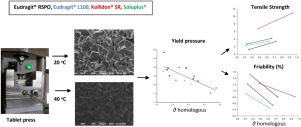Chemical Engineering Research and Design ( IF 3.7 ) Pub Date : 2020-01-31 , DOI: 10.1016/j.cherd.2020.01.035 Ioannis Partheniadis , Alexandros E. Karantzalis , Rumit R. Shah , Nizar Al-Zoubi , Ioannis Nikolakakis

|
Hot-melt extrusion (HME) is increasingly applied in the pharmaceutical industry for the formulation of solid dispersions of drugs with improved solubility and release. However, tableting of milled extrudates may present problems due to adverse thermo-mechanical effects on elasto-plasticity. In this work compression of hot-melt extruded polyvinyl based and polymethacrylate polymers with glass transition temperatures (Tg) up to 80 °C was performed at ambient (20 °C) and elevated (40 °C, ‘hot’ compression) temperature aiming for compactibility improvement. Polymers were characterized for morphology, particulate properties, thermal properties, microhardness and compaction behavior (‘in-die’ force-displacement data). Hot-melt extruded polymers showed lower Tg and work of compaction but higher elastic recovery and yield pressure (Kuenz-Leuenberger and Kawakita models) resulting in weak tablets. ‘In all cases, ‘hot’ compression decreased considerably the yield pressure for both unprocessed and extruded polymers indicating greater plasticity. For Eudragit® RSPO, Eudragit® L100-55 and Soluplus® with microhardness between 2.20 and 2.69 MPa it also increased consolidation due to softening of edges, thus facilitating interparticle slippage, which explained their tablet strength enhancement. Conversely, it did not affect the consolidation of Kollidon® SR with lower microhardness 0.31 and the large strength increase was attributed to the yield pressure reduction and the closeness of its Tg (42 °C) with the compression temperature increasing molecular mobility and operation of intermolecular forces. Compared to ambient compression, greater plastic deformation due to ‘hot’ compression was visible in the SEM images of tablet surfaces by the extensive formation of interparticle boundaries and by the elimination of pores. Relationships were found between yield pressure, elastic recovery, tensile strength and friability of tablets with homologous compression temperature which may be useful during formulation.
中文翻译:

高温压缩对热机械加工的聚合物的致密性的影响
热熔挤出(HME)在制药工业中越来越多地用于配制具有改善的溶解性和释放性的药物固体分散体。然而,由于对弹塑性的不利的热机械作用,研磨的挤出物的压片可能存在问题。在这项工作中,在环境温度(20°C)和升高的温度(40°C,“热”压缩)的条件下,对玻璃化转变温度(T g)高达80°C的热熔挤出聚乙烯基和聚甲基丙烯酸酯聚合物进行压缩用于提高可压缩性。表征聚合物的形态,颗粒性质,热性质,显微硬度和压实行为(“模内”力-位移数据)。热熔挤出聚合物的T g较低压实工作,但较高的弹性回复率和屈服压力(Kuenz-Leuenberger和Kawakita模型)导致片剂变弱。在所有情况下,“热”压缩都会大大降低未加工和挤出聚合物的屈服压力,表明可塑性更高。对于显微硬度在2.20和2.69 MPa之间的Eudragit®RSPO,Eudragit®L100-55和Soluplus®,由于边缘软化,它还增加了固结度,从而促进了颗粒间打滑,这说明了它们的片剂强度得到了增强。相反,它不影响具有较低显微硬度0.31的Kollidon®SR的固结,而强度的大幅提高归因于屈服压力降低及其T g的紧密度(42°C)随压缩温度增加分子迁移率和分子间作用力。与环境压缩相比,由于广泛的颗粒间边界形成和消除了孔洞,在片剂表面的SEM图像中可以看到由于“热”压缩而产生的更大塑性变形。发现具有相同压缩温度的片剂的屈服压力,弹性回复,拉伸强度和脆性之间的关系,这在配制过程中可能有用。











































 京公网安备 11010802027423号
京公网安备 11010802027423号